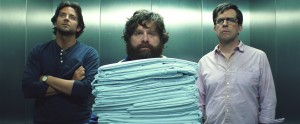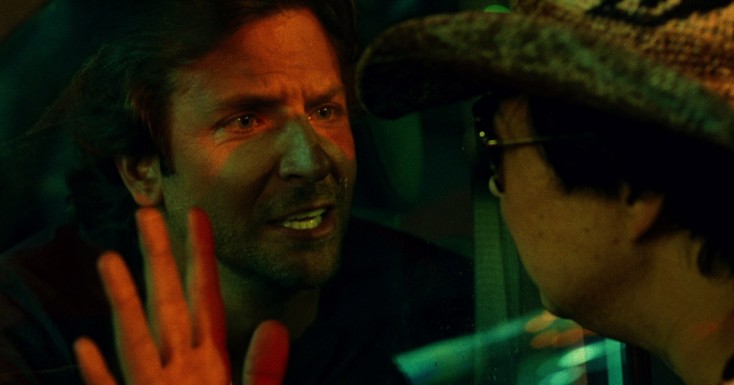
(L-r) BRADLEY COOPER as Phil, ZACH GALIFIANAKIS as Alan and ED HELMS as Stu in Warner Bros. Pictures’ and Legendary Pictures’ comedy “THE HANGOVER PART III.” ©Warner Bros. Entertainment.
By ANGELA DAWSON
Front Row Features
LAS VEGAS—This has been quite a remarkable year so far for actor Bradley Cooper. The Philadelphia native was nominated for an Oscar for his memorable performance in “Silver Linings Playbook.” He subsequently cemented his place as a solid dramatic actor in the critically acclaimed “The Place Beyond the Pines.” He landed the coveted lead role in an upcoming Steven Spielberg film. And he now returns in “The Hangover, Part III,” the third and final installment of the wildly successful comedy franchise.
Cooper, 38, reprises his role as fun-loving Phil Wenneck, a member of the Wolfpack, a group of friends who can’t help but get into trouble every time they go out and party a little too hard.
This time around, he, Alan (Zach Galifianakis) and Stu (Ed Helms) are back in Las Vegas to try save their friend Doug (Justin Bartha), who has been kidnapped by a gold thief (John Goodman). Goodman’s Marshall has nabbed Doug so the guys will retrieve the gold that was stolen from him by their old party pal Leslie Chow (Ken Jeong). Other returning cast members from previous installments include Heather Graham and Jeffrey Tambor. Joining the shenanigans in this finale directed by Todd Phillips, who also helmed the previous two, is Melissa McCarthy as a pawn shop proprietor.
Cooper recently returned to Sin City to reflect on his “Hangover” experience and what’s ahead.
Q: Do you have a memory of your favorite moment from the trilogy?
Cooper: We went to Venice and there was a windstorm.
Q: I’m impressed with how much heart this final installment has, and I was wondering if you had an idea beforehand where you wanted to see you character at the end of this trilogy?
Cooper: It’s more along the lines of where we wanted the movie to end up. I think we all think in terms of the story rather than each individual character. That’s what’s been so special about it. It does feel like a communal endeavor. The filming of the movie, the logistics of it, every day attacking a scene—it does feel like the four of us and ideas are thrown around and shared, and there’s no ownership at all. People sort of say that about collaborative experiences but this really is the case. It started in the first one but it really manifested itself in an economical way in the third one. (Zach’s) Alan is one of the most incredible creations of a comedic character in decades in film, so the fact that the story revolves around how the heck this guy is and how can we tame the beast was a wonderful choice that Todd Phillips made. Hopefully, (this is) the one audiences want to see. My hunch is it will be because there’s no more lost night. There’s no more inebriated devastation. It’s just let’s take care of our friend.
Q: Was there a moment during filming where you’re thinking, “I can’t believe what I’m doing?”
Cooper: Every day.
Q: What was your weirdest moment?
Cooper: The best part of answering that is going through and asking (myself) whether it was the baby in the closet or the monkey in the thing or the decapitated giraffe.
Q: Did you have any feelings about this one’s darker shift in tone?
Cooper: Well, there’s killing. If you talk to Todd, he would say the third is the darkest, based on the content. All of the characters are unhinged in the second one. They’re out of their comfort zone and in a foreign land. They’re screaming at each other. They’re trying desperately to make their way but it’s not working. This third one, the goal is to help Alan, to get Doug (Justin Bartha) back, but also to help Alan and be there for each other. So there were a lot more scenes in the third one that were like the first one of just driving in the car together—in-between moments that the second one didn’t have as much of because (Bangkok) was so chaotic. There weren’t these quiet moments by the roadside or finding a condom that he thinks is a snakeskin. Those sorts of things weren’t able to happen in the second one whereas in the third one there was that room. That was why I enjoyed the third one a lot. We all did because we got a chance to just sit with each other like we did in the first one.
Q: Did you all finish on the last day together and what was it like to say goodbye to this life-changing trilogy?
Cooper: Yeah. We were conscious of not making it a big deal. There was no clapping. There was a nice party on the stage.
Q: Where was that?
Cooper: It was on the sound stage at Warner Brothers but it wasn’t the last day. The last day was the coda scene that we shot recently. (It’s shown after the credits.)
Q: When did that happen?
Cooper: A month or two ago.
Q: Was it like, “Here we are all over again. Maybe we should consider doing a fourth?”
Cooper: No. That last bit was just a little bit of candy, not an opening up for another movie. The ending of the movie has closure and ties up everything that you didn’t even know wasn’t tied up, and moments from the first two movies.
Q: Are you guys going to collaborate again?
Cooper: We would love to. Zach had a good idea yesterday that we actually do film “Hangover 4” with just a Flip-cam.
Q: Have you played “The Hangover” slot machine yet?
Cooper: My mom has.
Q: What changes did you notice in (director and co-writer) Todd Phillips over the course of making these three films?
Cooper: I think he’s evolved, as we all have, and grown and evolved since the first film. Warner Brothers gave him creative flexibility to the nth degree for the first one, right down to marketing and everything. It is his vision executed down to us. Cinematically, you’re watching this guy just blossom. He’s got like a 110-piece orchestra scoring this third one as opposed to Kanye West scoring the first one, basically. The lenses he chose to use to film it are different and the scope is more cinematic. The movie is quite stunning visually and rhythmically. No comedy director makes movies like this. There’s not one that I can think of that does it quite this way. That’s really why we keep coming back.
Q: Without giving anything away, there’s a pretty amazing stunt you guys do hanging off a building. How much of that was you, or did you have stuntmen?
Cooper: It was a huge stunt. It was a building that we built on a sound stage. It was the biggest sound stage that Warner Bros had because it goes deep down into the ground.
Q: I understand you’re going to star in “American Sniper,” directed by Steven Spielberg.
Cooper: Yeah, we bought the rights to that about a year and a half ago.
Q: Is comedy still interesting to you now that you have done dramatic films?
Cooper: Of course. I don’t see it at all as separate things. As much as a drama “Silver Linings Playbook” was, there was a lot of comedy in it. We were very conscious of that as we were making it. Also, “American Hustle,” which is a David O Russell (directed) movie, has a lot of comedy in it. In an ideal world, the best dramas have levity in them so I don’t see it as two separate things at all. It’s really just (about the) filmmakers. I want to work with the best filmmakers.




